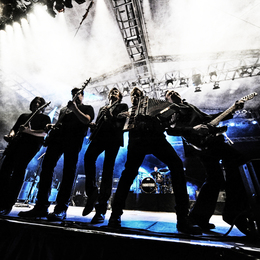
“It’s like a marriage,” says Dave Uosikkinen, referring to the permanence of his long-running Philadelphia-based band, The Hooters. There’s just one thing: The Hooters—progenitors of hit songs such as “All You Zombies,” “And We Danced” and “Day by Day”—have outlasted many marriages. The band celebrated 35 years of togetherness on Nov. 6 and 7, with two sold-out performances at the Keswick Theater in Glenside. There, Uosikkinen kept time behind the drum kit for bandmates Eric Bazilian and Rob Hyman, the band’s longtime leaders, as well as John Lilley, Fran Smith Jr. and Tommy Williams.
Both collectively and individually, The Hooters have left an indelible mark on the world of music. Besides hits from their own ever-growing catalog, the band’s songwriters have penned some of pop culture’s most memorable tunes, including Cyndi Lauper’s “Time After Time” (co-written by Hyman) and Joan Osborne’s “One of Us” (written by Bazilian).
Uosikkinen—raised in Levittown, now living in Wayne—has been working on his songwriting, too, with help from Bazilian. “Eric’s mentoring me, trying to make me into a songwriter,” Uosikkinen says. “He said, ‘David, you have more to contribute here.’” Their collaboration produced a new song, “Call Your Name,” which they wrote and recorded in one day. In October, WXPN dubbed “Call Your Name” its Gotta Hear Song of the Week.
In addition, Uosikkinen has been tending a project called Dave Uosikkinen’s In The Pocket, whereby he collaborates with a rotating lineup of fellow musicians to put a new spin on what he calls “the essential songs of Philadelphia.” Besides Uosikkinen’s bandmates, In The Pocket has featured notable artists such as Tommy Conwell, Dave Hause and Patty Smyth.
Uosikkinen put down his drumsticks for a few beats to share his thoughts on The Hooters’ 35-year history, the sacrifices he has made in the name of rock ‘n’ roll and the future of music.
The Hooters will always be huge in Philly, but I understand you have an even bigger audience overseas.
We did a 30-day summer tour in Europe, playing five countries. Germany is our hub, and we almost base our summers out of there. We did some huge festivals, and there’s a level of intimacy we have with fans over there that is unique. People really appreciate music of all kinds over there. … At the same time, I have a deep love for the United States, and I want to play here. I would love to tour the states, but it’s a tough life for people who play live music. I’m producing some younger artists these days, and I’m always thinking: Where are they going to go play? If it wasn’t for the Internet and classic rock radio, a lot of people would not have been introduced to our music, or reintroduced to it, like other bands from the ’80s. … Philly will always be home. I love the support we get here. The two shows at the Keswick sold out within an hour of each other. We probably couldn’t do that in Boston or Des Moines.
How does the reality of the past 35 years, working as a musician, compare with the expectations you had when you first started?
I had a hip replacement two and a half years ago. I also just bought a second set of hearing aids. So I guess I never expected to be giving up body parts—my hips, my hearing. Those sacrifices that I’ve made to do what I do, my expectations were never that. I remember the Rolling Stones saying, “We don’t expect to be doing this past 40,” and here I am, almost 60, and I still want to go on tour. I need to be around music, and I never thought I would sacrifice so much to do what I do. I didn’t realize how much it meant to me.
Tell us more about In The Pocket, which just turned five.
In The Pocket has gone unbelievably and surprisingly well. … Besides the recording, one saving grace has come from starting to play live shows. Early on we were thinking it would be us playing in a small bar in Conshohocken, but [in September] we opened for the Doobie Brothers and Steve Miller at the Susquehanna Center [in Camden, N.J.]. It will go on for as long as people support it.
As far as the sales numbers are concerned, I wish more people would buy [the music], but people are still conditioned to get their music for free. For me, it has been a huge success, because we’re always getting booked for shows. The Hooters play a long set—two and a half hours—but it’s much different with In The Pocket, which allows me to grease my wheels a little bit. … I’m always pushing other people to sing songs for In The Pocket, and I might push myself to get out there and do it, whether people like it or not.
I always thought that as I was getting up there in age, I’d be waiting around for someone to call me. That hasn’t been the case. With The Hooters and In The Pocket, the other things I do, I’ve been really busy with everything.
Photograph by Bearbeitet


